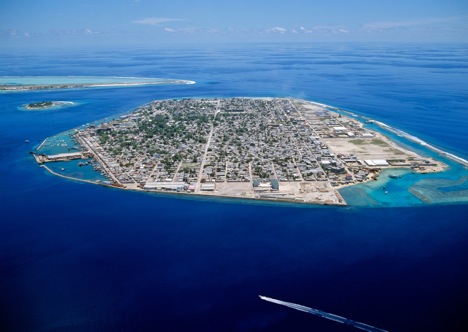US seeks military presence in Maldives

Malé, capital of Maldives. Source: Alamy/Legion Media
The intriguing ‘leak’ of a draft Status of Forces Agreement [SOFA] between the United States and the Maldivian government has led to reluctant confirmation by both countries that they are indeed involved in discussion with each other to conclude such an agreement.
The draft agreement “incorporates the principal provisions and necessary authorisations for the temporary presence and activities of United States forces in the Republic of Maldives and, in the specific situations indicated herein, the presence and activities of United States contractors in the Republic of Maldives.”
However, the US embassy in Colombo has maintained that “There are no plans for a permanent military base in Maldives. SOFAs are normal practice wherever the Unites States cooperates closely with a country’s national security forces. SOFAs generally establish the framework under which US personnel operate in a country when supporting security-related activities and the United States is currently party to more than 100 agreements that may be considered a SOFA.”
On the other hand, the draft SOFA is a sweeping document which says, “The Republic of the Maldives authorises United States forces to exercise all rights and authorities with Agreed Facilities and Areas that are necessary for their use, operation, defence or control, including the right to undertake new construction works and make alterations and improvements.”
Interestingly, the US recently signed a memorandum of understanding with Maldives, which will lead to the American side providing the border control, system for the island and manage it. Effectively, it puts the US in control of entry points into the island from the outside world.
The Maldives government insists that it is yet to decide on the SOFA. Evidently, the US is pressing hard. Last month, a US aircraft carrier USS John C Stennis visited Maldives.
The draft SOFA envisages that the Maldives would “furnish, without charge” to the US unspecified “Agreed Facilities and Areas”, and “such other facilities and areas in the territory and territorial seas of the Republic of Maldives as may be provided by the Republic of Maldives in the future.”
It specifies: “The Republic of the Maldives authorizes United States forces to exercise all rights and authorities with Agreed Facilities and Areas that are necessary for their use, operation, defense or control, including the right to undertake new construction works and make alterations and improvements.”
It further says, the US would be authorised to “control entry” to areas provided for its “exclusive use,” and would be permitted to operate its own telecommunications system and use the radio spectrum “free of cost to the United States”.
Besides, the US would also be granted access to and use of “aerial ports, sea ports and agreed facilities for transit, support and related activities; bunkering of ships, refuelling of aircraft, maintenance of vessels, aircraft, vehicles and equipment, accommodation of personnel, communications, ship visits, training, exercises, humanitarian activities.”
Interestingly, the SOFA confers on the US personnel (and civilian staff) “the privileges, exemptions and immunities equivalent to those accorded to the administrative and technical staff of a diplomatic mission under the Vienna Convention”, and guarantees that the Maldives laws won’t be applicable to the US personnel, who will be subject exclusively to the criminal jurisdiction of the United States.
The US personnel and contractors would also be permitted to import and export personal property, equipment, supplies and technology without license, restriction or inspection, or the payment of any taxes, charges or customs duties.
Most important, the vessels and vehicles operated by, and for, US forces would be permitted to enter and move freely within the territorial seas of the Maldives, free from boarding, inspection or the payment of landing, parking, port or harbour fees.
It is unclear whether New Delhi is aware of this hugely important development, which holds far-reaching implications for India’s strategic environment.
The Maldives Defence Minister Mohamed Nazim concluded a 4-day visit to India only 10 days ago. The Indian statement on Nazim’s talks with his counterpart A. K. Antony said, “As close neighbours sharing common security concerns, there is scope to further develop the relationship in mutually agreed areas. Shri Antony conveyed that India stands committed to enhance the ongoing defence and security partnership with Maldives.”
Needless to say, it will be a tectonic shift in the geopolitics of the Indian Ocean region if the US secures a military presence in the Maldives. Generally speaking, Indian pundits blithely assume that the US’ military presence in the region is benign and to India’s advantage. Their obsession is about China’s potential naval presence in the Indian Ocean.
The India-Maldives ties came under serious strain in the recent period following Delhi’s ill-conceived move to push a democracy project in Maldives. The US diplomacy has apparently cashed in on the resultant situation by filling in the crucial role that India traditionally occupied in Maldives’ national security calculus.
Significantly, the western powers – US, Britain, Australia, etc. – have all but piped down lately on the democracy deficit in Maldives. In retrospect, the democracy project served the key purpose of pressuring the Maldives government to open up to western patronage.
In sum, India’s loss has been the US’s gain. The draft SOFA is here.
All rights reserved by Rossiyskaya Gazeta.
Subscribe
to our newsletter!
Get the week's best stories straight to your inbox